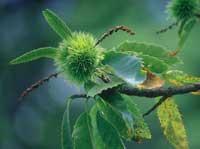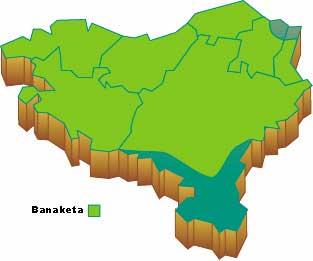Wide and robust tree: chestnut

Within this family are mainly the trees, constituting the most important forests of the temperate regions of the Northern Hemisphere. Inside are mentioned 8 genera, the Fagus, Castanea and Quercus, very known in our environment. On the other hand, within the genus Castanea are mentioned 12 species, among which is the Castanea sativa and the Castanea crenata native of Korea, China and Japan.
Robust tree, up to 30 m tall, with a wide and rounded crown. Fragile crust, soft in young people and marked by age. The leaves are quite large, elongate-lanceolate and thick sawn.
The prawns are born in leaf axils, long, thin and wild. The female flowers are scarce at the foot. The male flowers, on the other hand, are much more abundant and constitute most of the shade. It blooms in the middle of the spring. It has fruits, chestnuts, rounded and hardened carlo (with long pubescent spines). The chestnuts mature in autumn.

This species seems to be native to the eastern Mediterranean, but its location on the peninsula is very old. In Euskal Herria, chestnuts spread widely, especially on the Atlantic side. But since the beginning of this century, little by little it has suffered a great delay due to the influence of ink and tancro. Today, there are only a few remnants of these huge chestnuts, a few trees and some pujos born from the rear, which appear dispersed. On the other hand, it can be said that the climate is humid and temperate in acidic soils.
Chestnuts are very good foods, despite their slowness. In Euskal Herria has been one of the traditional foods. Its hard wood is appreciated in carpentry and woodwork. It has been used as a medicinal herb and its bark is astringent.
Family: fagaceae Species: Castanea sativa Distribution: Quite common on the Atlantic side Habitat: mixed forests of leafy and siliceous soils Medicinal herb: yes |





